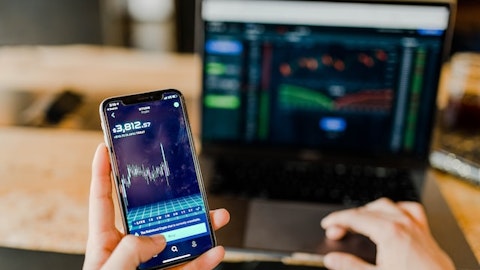2. Apple Inc (NASDAQ:AAPL)
Number of Hedge Fund Investors: 184
Talking about the latest report by Counterpoint pointing to strong Apple Inc (NASDAQ:AAPL) iPhone 16 sales in China, Jim Cramer said on CNBC:
“According to an outfit called Counterpoint, which is a Bloomberg — provided to Bloomberg, sales are up 25%. This is completely counter to every single report we got. This sounds much more authoritative. I believe it. I think the stock is going to blow through a lot of levels here. I don’t understand why people didn’t get that what happens in China is that the stimulus is impacting some areas, not others.”
Almost every bullish case on Apple Inc (NASDAQ:AAPL) was built around this assumption: millions of people would rush to upgrade their iPhone because of AI features. But the latest numbers for iPhone 16 do not show much enthusiasm for the new device.
Apple Inc (NASDAQ:AAPL) has been seeing a long-term decline in mobile carrier upgrade rates, especially postpaid, for several years. This suggests that people are holding onto their devices longer, likely due to economic factors, satisfaction with current technology, or a lack of exciting new features in recent models. This trend isn’t great for Apple Inc (NASDAQ:AAPL). Can Apple Intelligence break this trend? We’ll find out soon.
However, the assumption that we will see a huge upgrade cycle of iPhone just because of AI is big and comes with a lot of risks. Apple Inc (NASDAQ:AAPL) trades at a forward PE multiple of around 35x, well above its 5-year average of nearly 27x. Its expected EPS forward long-term growth rate of 10.39% does not justify its valuation, especially with the iPhone upgrade cycle assumption. Adjusting for this growth results in a forward PEG ratio of 3.33, significantly higher than its 5-year average of 2.38.
Vltava Fund stated the following regarding Apple Inc. (NASDAQ:AAPL) in its Q3 2024 investor letter:
“You probably have not missed the news that Warren Buffett has already sold half the stock from his largest public markets investment, Apple Inc. (NASDAQ:AAPL). It was a phenomenal investment for Berkshire. Over the course of seven years or so, it brought a profit of well over USD 100 billion. Apple comprised a very large position within Berkshire’s public portfolio, and this was the reason we avoided Apple stock outright during that time. We considered our exposure to Apple through our holdings of Berkshire stock to be sufficient, and we ended up making a lot of money on it. There has been a great deal of speculation in the market about what Buffett’s sale of Apple signals regarding his view of the stock market. I think the reason for the sale is much simpler. Buffett probably considers Apple stock so expensive that he prefers to cash in at 20% less (after all, Berkshire must pay tax on its profits). He started selling in the first quarter of the year. When I was in Omaha for the general meeting in May, Buffett said he was still selling, and I expect he continued to do so in the third quarter. I have to say that, as a Berkshire shareholder, I am happy about the Apple sale. I think Berkshire’s management will find a better use for this money, as they always have in the past. It is quite likely that they already have a very specific idea about this. If that takes two or three years, it does not matter at all. This is not a race and, in the meantime, the risk of holding Berkshire Hathaway stock itself has been greatly reduced.”





